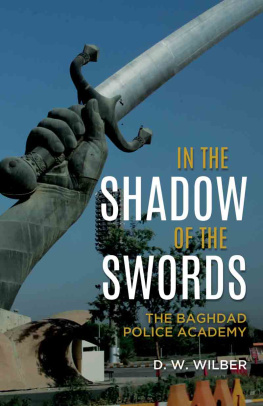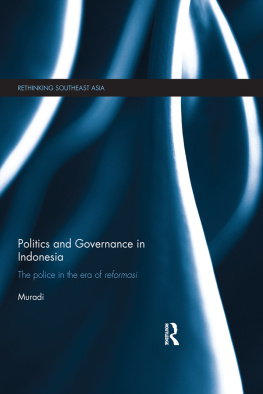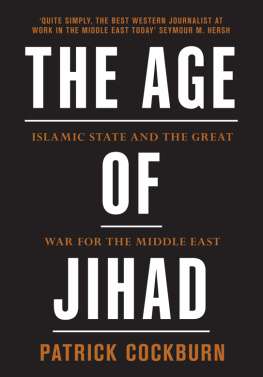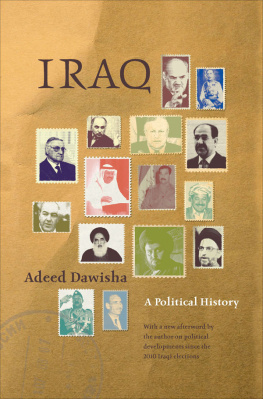Policing Iraq
Policing Iraq
Legitimacy, Democracy, and Empire in a Developing State
JESSE S. G. WOZNIAK

University of California Press
University of California Press
Oakland, California
2021 by Jesse S. G. Wozniak
Library of Congress Cataloging-in-Publication Data
Names: Wozniak, Jesse S. G., 1982 author.
Title: Policing Iraq : legitimacy, democracy, and empire in a developing state / Jesse S. G. Wozniak.
Description: Oakland, California : University of California Press, [2021] | Includes bibliographical references and index.
Identifiers: LCCN 2020037086 (print) | LCCN 2020037087 (ebook) | ISBN 9780520355705 (cloth) | ISBN 9780520355712 (paperback) | ISBN 9780520975972 (ebook)
Subjects: LCSH: Kurdistan (Iraq). ikumeti Heremi Kurdistan-Eraq. | PoliceIraqHistory21st century.
Classification: LCC HV8242.55 W68 2021 (print) | LCC HV8242.55 (ebook) | DDC 363.209567/2dc23
LC record available at https://lccn.loc.gov/2020037086
LC ebook record available at https://lccn.loc.gov/2020037087
Manufactured in the United States of America
30 29 28 27 26 25 24 23 22 21
10 9 8 7 6 5 4 3 2 1
To Mom and Dad
I am who I am because somebody loved me.
Contents
Acknowledgments
A few years back I was teaching a qualitative methods course, and when discussing issues surrounding access and how to actually get a major research project going, the students asked if I had any advice from my own experience. I struggled to come up with any concrete recommendations. As with so much of my life, this project came about by me stumbling backward into good fortune. The best I could come up with for them was to be lucky enough to meet a bunch of great people who help you for no other reason than theyre great people. Im fortunate enough to have a long list of great people to thank.
My undergraduate mentors Kent Sandstrom and Steven Muzzatti deserve a great deal of praise or condemnation for sending me on this career path. Joshua Page, Ron Aminzade, and Theresa Gowan provided great mentorship and extensive notes on early portions of this project, and Chris Uggen was central as both my PhD advisor and continued cheerleader in the years since. Gabrielle Ferrales is owed a world of thanks not only for her continued mentorship and critical notes on the manuscript but also for first introducing me to the research contacts that got this project off the ground and then later helping to design research materials and provide tireless assistance (and enthusiasm!) in the research project. There is simply no way this project would have happened without Gab. Wenjie Liao similarly contributed to the research design of work that didnt make it directly into this book but greatly informed my understanding. Sincere thanks to Maura Roessner and Madison Wetzell of UC Press for their belief in the manuscript, invaluable assistance in putting the book together, and polite patience with my incessant inquiries.
This project would have never begun without the kind assistance of Daniel Rothenberg, Kari Kammel, Kandy Christensen, and Kurdistan Dayole from the International Human Rights Law Institute in Sulaymaniyah. Special thanks to Shamal Hussein and Hiwa Sadiq for their invaluable translation assistance and friendship, and to Hardy for driving me where I needed to go. Many thanks to the wonderful friends I gained in SulyDr. Farhad, Alex, Lukacs, Nwenar, Ramyar, Kamaran, and Luke. Most special thanks to Dr. Anwer Jaff, whose invaluable connections have been absolutely essential to my research, and whose friendship, insights, and hospitality I will never be able to repay. A similar debt of gratitude is owed to the many police, judges, and lawyers who volunteered their time and assistance. And, of course, a hearty thank you to the Kurdish people, whose kindness and hospitality remains simply overwhelming.
A portion of this project was funded in part by the West Virginia Humanities Council and in even smaller, though much more meaningful, part by the members of Graduate Student Workers United. No major funding agencies provided any assistance for the research contained in this book, as it was deemed unlikely to be completed, in the words of one such rejection. The only major source of funding for this research was provided by Josephine Poplar Wozniak, a light to this world who is sorely missed. While she likely couldnt have envisioned how I would end up using the government savings bonds she sent me as an infant, I hope Ive made her proud. The entirety of this manuscript was written with a smelly old dog snoring loudly at my feet, who moved on to that great farm up north shortly after the book was completed and will be forever missed. Finally, if youve read this far, youre assuredly one of my parents, so, hi Mom! Hi Dad!
Map 1. Islamic State territorial control at the organizations peak. Base map by Koen Adams of onestopmap.com, with territorial control by Evan Centanni and Djordje Djukic. All rights reserved.
Map 2. Kurdish territorial control at the time of the 2017 independence referendum. Graphic by Evan Centanni and Djordje Djukic, incorporating base map by Koen Adams of onestopmap.com. All rights reserved.
1
Kurds, Criminal Justice, and State Legitimacy
WELCOME TO SOUTH KURDISTAN
Sulaymaniyah is known as the intellectual and cultural capital of the Kurdistan Regional Government (KRG), the semiautonomous region of Northern Iraq. Upon arrival, you leave the heavily fortified airport and turn east down

(Salim, a street) and head into town. Immediately you pass the gleaming new classrooms and office buildings of the American University of Iraq in Sulaymaniyah, one of many expensive US projects in the area. Continuing a few kilometers down the freshly paved four-lane road, you enter Suly proper. In the distance, towering over the city, you can see the

(Shari Jwan, Grand Millennium hotel), modeled after

(Burj Al Arab), the famous sailboat skyscraper of Dubai. The smooth blacktop takes you past a number of gleaming high-rises and beautiful storefronts selling the latest fashions and technologies, until you arrive at the historical bazaar in the center of the city. Were you to take Salim from the airport to the bazaar and back (as is a typical route for visiting politicians and dignitaries), youd believe Suly is an incredibly prosperous city, free from the economic and political strife of the rest of the nation, a sure sign the reconstruction is delivering a prosperous new future to at least this corner of Iraq.
And to some extent, youd be correct; Suly has a relatively prosperous economy and is much more secure and stable than most of the nation. But step out of the car and wander around the corner, down any side street off Salim, and suddenly youre confronted with a very different view. You quickly see that the gleaming faades of the stores and hotels are quite literally that; while the front side facing Salim is shiny and new, the other three sides of the building are likely drab, crumbling concrete that looks ready to topple at any time. The roads stop being wide with fresh, smooth pavement and instead become narrow, neglected pathways marked by sizable potholes. Leaving the car and wandering the neighborhoods of the city quickly demonstrates the largess of Suly to be in many ways a Potemkin village of progress, a shiny faade masking a region and a nation embroiled by civil war, unemployment, financial crisis, and shortages of basic necessities.










 (Salim, a street) and head into town. Immediately you pass the gleaming new classrooms and office buildings of the American University of Iraq in Sulaymaniyah, one of many expensive US projects in the area. Continuing a few kilometers down the freshly paved four-lane road, you enter Suly proper. In the distance, towering over the city, you can see the
(Salim, a street) and head into town. Immediately you pass the gleaming new classrooms and office buildings of the American University of Iraq in Sulaymaniyah, one of many expensive US projects in the area. Continuing a few kilometers down the freshly paved four-lane road, you enter Suly proper. In the distance, towering over the city, you can see the  (Shari Jwan, Grand Millennium hotel), modeled after
(Shari Jwan, Grand Millennium hotel), modeled after  (Burj Al Arab), the famous sailboat skyscraper of Dubai. The smooth blacktop takes you past a number of gleaming high-rises and beautiful storefronts selling the latest fashions and technologies, until you arrive at the historical bazaar in the center of the city. Were you to take Salim from the airport to the bazaar and back (as is a typical route for visiting politicians and dignitaries), youd believe Suly is an incredibly prosperous city, free from the economic and political strife of the rest of the nation, a sure sign the reconstruction is delivering a prosperous new future to at least this corner of Iraq.
(Burj Al Arab), the famous sailboat skyscraper of Dubai. The smooth blacktop takes you past a number of gleaming high-rises and beautiful storefronts selling the latest fashions and technologies, until you arrive at the historical bazaar in the center of the city. Were you to take Salim from the airport to the bazaar and back (as is a typical route for visiting politicians and dignitaries), youd believe Suly is an incredibly prosperous city, free from the economic and political strife of the rest of the nation, a sure sign the reconstruction is delivering a prosperous new future to at least this corner of Iraq.